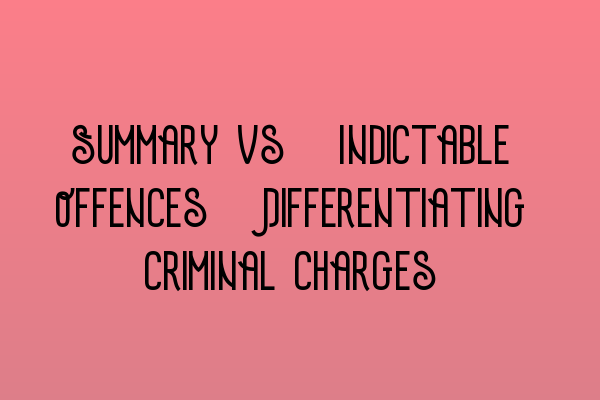Summary vs. Indictable Offences: Differentiating Criminal Charges
Understanding the differences between summary and indictable offences is crucial when it comes to criminal charges in the UK. As a solicitor, it is essential to be well-versed in the nuances of these charges in order to provide the best legal representation for your clients. In this article, we will discuss the key characteristics of summary and indictable offences, the processes involved, and the implications for individuals facing criminal charges.
What are Summary Offences?
Summary offences are generally considered less serious criminal charges. These offences are usually tried in Magistrates’ Courts and are heard by a judge or a panel of magistrates. Examples of summary offences include minor assaults, petty theft, public order offences, and certain driving offenses.
Summary offences are often handled more swiftly and efficiently compared to indictable offences, with the goal of ensuring a timely resolution. The maximum penalty for summary offences is generally limited to six months’ imprisonment or a fine, or both.
If your client is facing charges for a summary offence, it is essential to strategize a strong defense that takes into account the specifics of the case and applicable laws. A skilled solicitor will explore all avenues to secure the best outcome for the client, whether it be negotiation, challenging evidence, or presenting an effective defense in court.
What are Indictable Offences?
Indictable offences, on the other hand, are more serious criminal charges that are typically tried at Crown Courts. These offences include crimes such as murder, rape, robbery, and large-scale drug trafficking. Indictable offences are generally heard by a judge and a jury, providing a more elaborate and comprehensive judicial process.
The penalties for indictable offences are typically more severe, reflecting the gravity of the crimes. Murder, for example, carries a life sentence, while other indictable offences may lead to lengthy imprisonment and significant fines. The complexity and seriousness of indictable offences necessitate thorough investigation, detailed evidence analysis, and strategic legal representation.
As a solicitor, it is vital to have a deep understanding of the laws surrounding indictable offences and to work diligently to build a robust defense strategy for your clients. This may involve challenging the prosecution’s case, investigating any potential procedural errors, or presenting a compelling argument to convince the jury.
The Process
The process for summary and indictable offences differs due to the varying severity and complexity of the charges. For summary offences, the process typically involves the following:
- Arrest or issuance of a summons
- Entering a plea
- Case management hearings
- Trial
- Sentencing, if found guilty
On the other hand, the process for indictable offences is more comprehensive and includes the following:
- Arrest or charge
- Initial hearing at Magistrates’ Court to determine whether the case proceeds to Crown Court
- Plea and case management hearing at Crown Court
- Pre-trial preparation, including disclosure of evidence
- Trial by jury
- Sentencing, if found guilty
Conclusion
Summary and indictable offences represent distinct categories of criminal charges in the UK, each with its own set of characteristics and legal procedures. As a solicitor, it is crucial to be well-versed in these differences to provide effective legal representation for your clients.
If you or your client is facing criminal charges, it is advisable to seek the assistance of an experienced solicitor who specializes in criminal law. At SQE Criminal Law and Practice Law UK, we have a team of skilled and dedicated solicitors ready to defend your rights and secure the best possible outcome for your case.
For more information about the SQE exams, practice exam questions, preparation courses, and exam dates, please check out our related articles:
SQE 1 Practice Exam Questions,
SQE 1 Practice Mocks FLK1 FLK2,
SQE 2 Preparation Courses,
SQE 1 Preparation Courses,
SRA SQE Exam Dates.
